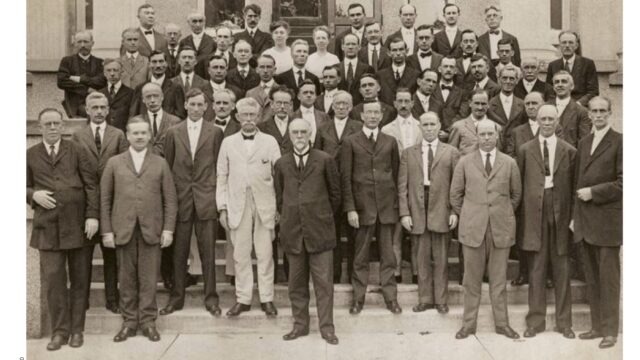The Jackson, Michigan, congregation was organized in 1849.

Jackson Adventist church in Jackson, Michigan, United States, is the oldest continuous Seventh-day Adventist congregation in the world. The congregation recently celebrated its 175th anniversary, marking nearly two centuries of remarkable contributions to the Adventist movement.
The celebration highlighted the church’s role as a spiritual and historical landmark within the denomination, with a rich legacy of firsts that continues to inspire generations of Adventists.
At the heart of the festivities was a powerful presentation by Brian Strayer, a historian and expert on Adventist history, whose deep dive into the church’s origins left the congregation both reflective and energized for the future. Titled “Jackson, Michigan: God’s Great Battleground,” Strayer’s presentation painted a vivid picture of the church’s foundational moments, starting with Joseph Bates’s fateful arrival in Jackson in 1849.
“Jackson is where Adventism took root in Michigan,” Strayer remarked. “This is where Joseph Bates, led by a dream, came and found a tiny group of former Millerites, including blacksmith Dan Palmer. Together, they embraced the Sabbath truth and set the stage for the creation of the Jackson Adventist church, a congregation that would go on to lead the way in many pivotal moments of Adventist history.”
From the very beginning, Jackson Adventist church was a place of pioneering “firsts.” It was here that the first Sabbath-keeping Adventist church in the Midwest was established in August 1849. This tiny congregation, meeting in the home of Dan Palmer, would grow into a cornerstone of the early Adventist movement, sending ripples across the region and beyond.
Strayer detailed a long list of historical milestones achieved by the Jackson church, including its leadership in evangelism, mission work, and institutional support. “Jackson financed the very first evangelistic tent meetings in Michigan in the 1850s,” Strayer noted. “In fact, the entire evangelistic tent work in the state was funded by this one church.”
The church’s generosity extended far beyond state lines. In 1855, when the Review and Herald press needed to be moved from Rochester, New York, to Battle Creek, the Jackson congregation raised the entire US$1,200 needed to cover the costs. This extraordinary feat was led by local members like Dan Palmer, J. P. Kellogg, and Henry Lyon, who consistently stepped up to support the growing Adventist movement.
One of the most compelling stories Strayer shared was about the 1852 conversion of Merritt and Angeline Cornell, early Adventist pioneers, to the Sabbath truth. It was in the Palmer home, under Joseph Bates’s teachings, that Merritt Cornell accepted the Sabbath, launching a missionary career that would reach across the United States and even to Europe.
Another fascinating historical tidbit was the role the Jackson church played in funding early Adventist evangelism. Strayer recounted how James White had timidly suggested that perhaps the church could raise funds for a tent. The congregation’s response was overwhelming, raising the US$200 needed within days, allowing White and other pioneers to preach across the state.
“Jackson wasn’t just a congregation,” Strayer said. “It was a movement — a movement of faith, evangelism, and generosity that impacted the entire Adventist church.” The church’s efforts included sending out evangelists like John Loughborough and Merritt Cornell, who spread the Adventist message throughout the Midwest and beyond.
Beyond evangelism, Jackson Adventist church was known for its deep commitment to unity and spiritual growth. Ellen White herself praised the church for its efforts to maintain “gospel order” and harmony among its members. In fact, the Jackson believers were among the first to build a dedicated Adventist meeting house in 1854, preceding even the famed Battle Creek congregation.
Strayer also touched on some of the more dramatic moments in Jackson’s history, including Ellen White’s narrow escape from a train accident near Jackson in 1854, a miraculous event that she later attributed to divine intervention. These stories, combined with the church’s long list of achievements, showcased Jackson’s unique place in Adventist history.
Throughout the years, Jackson Adventist church continued to set precedents, both spiritually and institutionally. Strayer highlighted 50 key “firsts” in the church’s history, including the first Sabbath-keeping Adventist band in the Midwest, established in 1849; the first Adventist congregation to fund two evangelistic tents for Michigan in 1854-55; the first church to support the relocation of the Review and Herald press to Battle Creek in 1855. Also, besides being the first Adventist church to build a dedicated meeting house in 1854, it was the place of the first camp meetings, held in Jackson in the 1880s, which drew thousands of attendees and became a model for Adventist camp meetings nationwide.
As Strayer concluded his historical review, he reminded the congregation of the powerful legacy they have inherited. “Jackson has been a great battleground for the cause of God, a place where spiritual victories have been won time and again,” he said. “From its early days as a fledgling group of believers meeting in a blacksmith shop to its role as a leader in Adventist evangelism, Jackson Adventist church has been at the forefront of spreading the gospel and serving the community.”
Looking forward, the Jackson Adventist church congregation plans to continue this legacy of service and evangelism. As part of its 175th-anniversary celebration, the church launched a five-year mission plan focused on community outreach, Bible study, and evangelism, ensuring that the church remains a vital force for years to come.
Reflecting on the church’s enduring legacy, the congregation’s current pastor, Ian Santos, encouraged the congregation to embrace their heritage and build upon it. “Jackson church has always been a lighthouse of faith,” Santos said. “As we look to the future, may we continue to be that light, sharing the love of Christ with our community and beyond.”
During the worship service, Ray Torres, pastor of the Brighton Seventh-day Adventist Church and former pastor of Jackson church, reminded the congregation of the deep roots of the church and the faith of their forefathers, calling on everyone to stay true to their spiritual mission.
“The only way this church, locally and worldwide, can move forward is by continuing to take the message forward,” Torres said. “We pray for the hastening of His coming.”
The Michigan Conference’s ministerial director, Cody Francis, echoed these sentiments, emphasizing Jackson church’s pivotal role in establishing Adventism in Michigan. “Before there was a Seventh-day Adventist, there was a Sabbath-keeping congregation here in Jackson,” Francis remarked, highlighting the church’s pioneering spirit. He called on the congregation to honor their past by continuing to share their faith and to look toward future ministry opportunities. “God has blessed your past, but God has even greater blessings for the future.”
The original version of this story was posted on Lake Union Herald.














